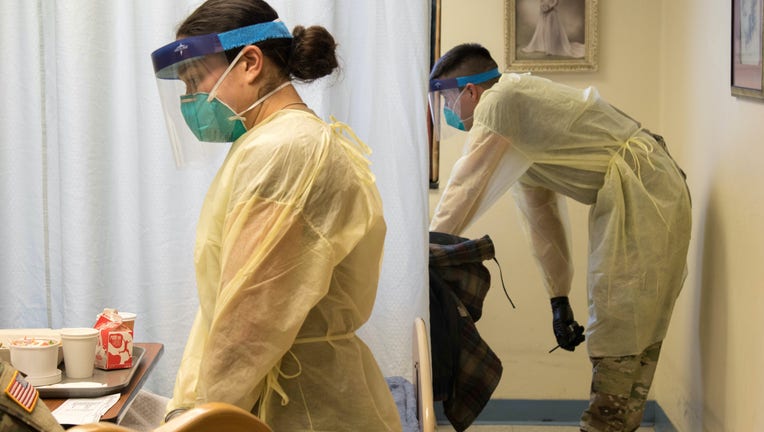Where will the bodies go? Morgues plan as coronavirus grows

Soldiers from the Massachusetts National Guard provide aid to hospital staff amid the coronavirus pandemic. (Massachusetts National Guard photo by Army Spc. Samuel D. Keenan)
PHILADELPHIA - Cities and states that haven’t been hard-hit yet are trying to prepare for the worst.
It’s hard to say exactly how much morgue space is available nationwide. Many cities and counties submit emergency preparedness plans for review by state and federal officials, but tallies aren’t always complete and private mortuaries aren’t always included. Trade groups like the National Association of Medical Examiners don’t track those capacities either.
FULL COVERAGE: CORONAVIRUS
But, in general, few morgues in the country can hold even 200 to 300 bodies.
In Washington, D.C., which has a morgue that can hold about 270 bodies, officials said they would seek help from federal partners if needed. Dallas has a plan for refrigerated space as part of its emergency preparedness efforts. And Chicago is already using a trailer outside the medical examiner’s office for the bodies of coronavirus victims, and may use a refrigerated warehouse if needed.
Meanwhile, the Federal Emergency Management Agency has asked the Defense Department for 100,000 body bags, Pentagon spokesman Air Force Lt. Col. Michael Andrews said Thursday.
RELATED COVERAGE:
Trump says ‘toughest’ weeks ahead as coronavirus spreads
New Jersey coronavirus deaths top state’s 9/11 toll
Funeral homes offer virtual services during COVID-19 pandemic
Interactive map tracks spread of COVID-19 globally
On a daily basis, the system works at essentially full capacity in most jurisdictions, said Robert A. Jensen, co-owner of Kenyon International Emergency Services, a private disaster response company based in Texas.
“They’re not made for surge. They’re made to handle the daily numbers,” said Jensen, whose company has helped with mass fatality incidents from 9/11 to Hurricane Katrina to the 2004 tsunami in Thailand, all of which involved using refrigerated trucks to store bodies.
In Pennsylvania, the state coroner’s association is working to figure out resources and help with what will likely be regional planning.
Brian Abernathy, Philadelphia’s Managing Director, said the city had secured refrigerated trucks to help with any overflow storage needed for bodies. The city had reported 35 deaths as of Saturday.
“This isn’t because we expect a large influx of people succumbing to the illness, but rather it’s likely that there will be fewer funerals, which will cause backups in both our city morgues as well as the hospital morgues,” Abernathy said.
Brian Murphy, the CEO of Arctic Industries, which manufactures walk-in coolers and quick-assemble modular structures in Miami and Los Angeles, said he is getting calls seeking help. In the past, most clients were from the food industry, but with restaurants shuttered, calls about mortuary needs have risen.
He says his company is prioritizing work related to COVID-19 and is considering working more hours to meet needs.
“Everything is very much in flux,” Murphy said.
The families of the dead, meanwhile, are making do.
Rosina Argondizzo of Glenview, Illinois, was buried in March with just a priest and four people present: her husband of 58 years, her son Peter, his wife and their son. Another son who lives in Italy didn’t travel. Peter Argondizzo said his 79-year-old mother, who died after contracting pneumonia and the flu, would have had a very different funeral in normal times.
“We’re Italian so it would have been a lot of people. ... It would have been big,” he said, adding they would have hosted a meal in her honor, something they now hope to do at a later date. “She would have wanted everyone to have been well-fed.”
David Dittman said he inquired about waiting to hold a funeral for his 94-year-old mother, Ruth, who died after battling cancer, so more family could attend.
But the funeral home handling arrangements in Connecticut didn’t want to hold the body for more than two weeks.
He said he understood: “Especially with this rush of people that may be coming at them. They may be overwhelmed, you know.”

What is coronavirus?
From how it spreads to where it originated, here's a look at everything you need to know about the deadly contagion.
___
For the latest local news, sports and weather, download the FOX 29 News app.
DOWNLOAD: FOX 29 NEWS APP
___
Gresko reported from Arlington, Virginia. Associated Press writers Colleen Long and Robert Burns in Washington and Jennifer Peltz in New York contributed to this report.

